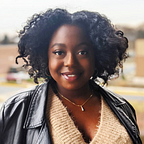Black Beauty Standards in the ‘Age of Instagram Face’
“I’m so ugly”
In a viral video, four-year-old Ariyonna can be seen uttering these words, seemingly provoked by a brief stare at her reflection.
The young girl’s stylist, Atlanta-based Shabria Redmond, can be seen immediately comforting her with compliments and words of affirmation. “Don’t say that. You are so pretty,” Shabria says in the video. “When you look at yourself, you’re supposed to say, I’m so pretty.“
Ariyonna can then be seen sobbing, overcome with emotion, before embracing Shabria in a hug. The video has since garnered millions of views and words of love and encouragement from the likes of Michelle Obama, Viola Davis, and Laverne Cox, just to name a few.
Matthew A. Cherry, director of the Oscar-winning short, “Hair Love,” also released a call to action for artists to draw pictures of Ariyonna, encouraging positive and inclusive representation for the young girl.
“She comes from a great home & loving mother,” Shabria said in a caption of the video. I just think when kids go to school they learn and pick up sooo much different things that they don’t know the definition but they know the feeling!
We’re in a time where we can’t deny the many doors that are being opened due to heightened representation of Black women in historically White spaces like entertainment, media, politics, and business.
From the groundbreaking work of directors like Ava DuVernay to the political prowess of leaders like Representative Ayanna Pressley — Black women have no shortage of magic and are letting it be known by creating opportunities for themselves and others.
However, younger generations, like the one to which Ariyonna belongs, still hold onto sentiments of inadequacy and self-hatred — particularly when it comes to beauty, raising questions like:
Why do young Black women experience these feelings when it comes to their own beauty and at such a young age, at times?
Are such feelings taught and learned? If so, where? How are they reinforced?
What responsibility do we have to ensure more girls like her are not impacted by a deep-rooted lack of self-confidence?
The nuance of these questions juxtaposed with what The New Yorker coins as The Age of Instagram Face, lends itself to a discussion about society's beauty standards and how we define what’s desirable and what is not.
“It’s a young face, of course, with poreless skin and plump, high cheekbones,” Jia Tolentino describes as she begins the piece. “…The face is distinctly white but ambiguously ethnic — it suggests a National Geographic composite illustrating what Americans will look like in 2050, if every American of the future were to be a direct descendant of Kim Kardashian West, Bella Hadid, Emily Ratajkowski, and Kendall Jenner”
The piece goes on to explore other layers of how access to social media has influenced our standards.
For example, media conglomerates have long been the decision-makers of what we know now to be unrealistic beauty standards. Now, with social platforms like Instagram, Snapchat, and their plethora of face-altering filters, your peers and favorite entertainment personalities set the standard.
Thinner. Smoother. Thicker. Lighter.
We see women of all backgrounds adopting a similar look, one that is celebrated and augmented by an increased ability to edit ourselves through surgical procedures or the latest version of FaceTune.
We see it in examples like 22-year-old beauty mogul and influencer Kylie Jenner, a premier case study for changing beauty ideals and the appropriation of Black features and culture.
This is further exasperated around topics of desirability, as evidenced in celebrity scandals, and an increase of ‘blackfishing’, or the performance of Black racial identity through choice of appearance through hairstyling, clothing, make up, and in many cases, an artificial tan.
These add to the mixed messaging around beauty. Black features are celebrated, but not on naturally Black women.
Black women and girls face a unique set of challenges in genuinely sourcing the confidence to celebrate their natural features. They always have.
As these standards continue to change, it’s become increasingly important for this community to be genuinely represented, respected, and celebrated as leaders, trendsetters and above all — human beings.
